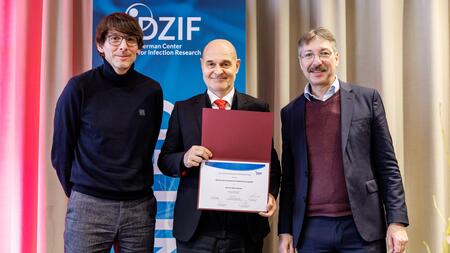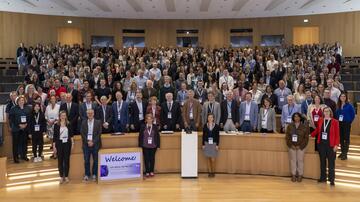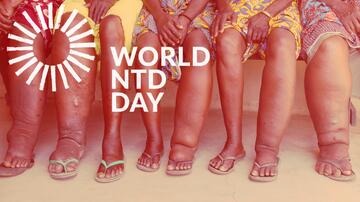Prof. Peter G. Kremsner receives the DZIF Prize for Translational Infection Research 2024
Award for groundbreaking malaria research
The DZIF Prize for Translational Infection Research 2024 was awarded to Prof. Peter. G. Kremsner (center). Prof. Jan Rupp as coordinator of the DZIF Academy and the chairman of the DZIF Executive Board Prof. Dirk Busch (right) presented the certificate at the Joint Annual Meeting of DGI and DZIF 2025 in Munich.
Prof. Dr. Peter G. Kremsner, a renowned tropical medicine specialist and infection researcher, has been awarded the DZIF Prize for Translational Infection Research 2024. The award recognizes his pioneering contributions to malaria research and his innovative approaches to developing new vaccines, therapies and prevention strategies. The award ceremony took place during the Joint Annual Meeting of the German Center for Infection Research (DZIF) and the German Society for Infectious Diseases (DGI) on February 14, 2025 in Munich.
Prof. Kremsner conducts research at the University Hospital of Tübingen and at the Centre de Recherches Médicales de Lambaréné (CERMEL) in Gabon. His work has contributed significantly to the development of new treatment approaches for malaria, a life-threatening infectious disease caused by parasites of the genus Plasmodium. Over the last three decades, he has been involved in the development of all new antimalarial drugs and drug combinations worldwide and has set new standards in clinical research.
New antimalarial therapies: pioneering innovative active agents
Prof. Kremsner was one of the first scientists to explore the combination of different active agents to reduce the formation of resistance—an approach that has significantly improved malaria therapy. The clinical trials he designed and conducted with drug combinations such as atovaquone-proguanil, amodiaquine-artesunate and pyronaridine-artesunate paved the way for their successful approval and use.
Prof. Kremsner played a major role in the development of the first approved malaria vaccine RTS,S (Mosquirix). In addition, he optimized vaccination strategies—also within the framework of the DZIF—including two vaccination regimens with attenuated sporozoites (a developmental form of plasmodia), which show a high protective efficacy of 80–85 percent (PfSPZ-CVac).
Another milestone of his work was the establishment of a reliable standard for the clinical testing of malaria vaccines. By infecting humans with malaria parasites in a controlled manner, he created a globally recognized basis for the clinical development of new antimalarial interventions in Germany. In cooperation with leading manufacturers of suitable parasites, he ensured that this research could be carried out under the highest quality standards.
Research with a global impact: from the laboratory in Gabon to cutting-edge international research
In 1992, Prof. Kremsner began his research in Africa in a small laboratory at the Albert Schweitzer Hospital in Gabon. In 2011, he founded the Centre de Recherches Médicales de Lambaréné (CERMEL), which has become one of the leading research centers for tropical diseases in Central Africa. Today, more than 300 scientists work there. With around 100 scientific publications annually, CERMEL sets international standards.
Prof. Kremsner actively promoted young scientists: More than 100 doctoral students supervised by him today shape tropical medicine as leading experts. With his team, he also developed the Lambaréné Organ Dysfunction Score, a predictive marker for rapid estimation of the severity of malaria in children in Africa.
In addition to his work on malaria vaccines, Prof. Kremsner was also involved in the development of the first approved Ebola vaccine (VSV-ZEBOV) and in clinical trials on the COVID-19 pandemic.
The DZIF Prize for Translational Research
"Prof. Kremsner's research has improved the lives of many millions of people," emphasized DZIF Chairman Prof. Dirk Busch in his laudatory speech. "He combines scientific excellence with global responsibility and raises global awareness of infectious diseases that are often forgotten. His commitment goes far beyond the laboratory and clinical trials."
Every year, the DZIF Academy presents the DZIF Prize for Translational Research to honor outstanding scientific achievements in the field of translational infection research. The prize, endowed with 5,000 euros, was formally presented to Prof. Kremsner on February 14, 2025 in Munich. The prizewinners from previous years are listed on the DZIF Academy website.
- Curriculum Vitae Peter G. Kremsner
Positions
- 2016 - present Associate Professor, Medical University of Vienna, Austria
- 2014 - present Managing Director, Comprehensive Infectious Disease Center Tübingen, University Hospital Tübingen, Germany
- 2011 - present President, Centre de Recherches Médicales de Lambaréné, Gabon
- 2008 - present Chair and Professor of Tropical Medicine, Travel Medicine and Human Parasitology and Director of the Institute of Tropical Medicine (Medical Clinic, Department VII) at the University Hospital Tübingen, Germany
- 1996 - present Professor of Parasitology at the University of Tübingen, Germany
- 1992 - 2011 Head of Research and Scientific Director of the Albert Schweitzer Hospital in Lambaréné, Gabon
- 1988 - 1996 Scientist at the Institute for Tropical Medicine, Berlin, Germany
- 1987 Scientist at the Superintendência de Campanhas de Saúde Pública, Rio Branco, Brazil
- 1985 - 1986 Scientist at the Institute for Specific Prophylaxis and Tropical Medicine, University of Vienna
Awards
- Dr Pascoal Mocumbi Prize, EDCTP, France (2023)
- L'Ordre National du Mérite Gabonais au Grade de Chevalier, Gabon (2018)
- Memento Prize, Germany (2017)
- Honorary International Fellow of the American Society of Tropical Medicine and Hygiene, USA (2017)
- Shepard Science Award, CDC Atlanta, USA (2015)
- Grand Prize of CENAREST, Gabon (2010)
- Fellow of the Royal College of Physicians in London, United Kingdom (2003)
Selected achievements
- Supervisor of more than 100 MD and PhD students
- Honorary professor in Hanoi, Vietnam (2018)




